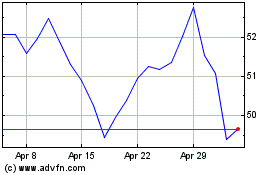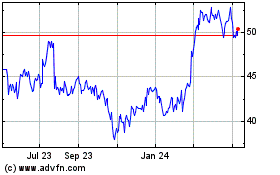By Cara Lombardo and Laura Stevens
This article is being republished as part of our daily
reproduction of WSJ.com articles that also appeared in the U.S.
print edition of The Wall Street Journal (January 23, 2019).
Two big hedge-fund investors are circling eBay Inc. and
suggesting it part ways with its StubHub ticketing and
classified-ads businesses, moves that could again fracture the
company at the hands of activists.
In recent years, eBay shares have languished as the company has
sought to distance itself from its reputation as an online auction
house and has battled the likes of Amazon.com Inc. in the
e-commerce arena.
Elliott Management Corp. said Tuesday it has a more than 4%
stake in eBay and urged the online marketplace to consider spinning
off or selling the businesses because they could be worth more
individually.
Another hedge fund, Starboard Value LP, also has a large
position in eBay, of less than 4%, and has broached those same
changes with the San Jose, Calif.-based company, according to a
person familiar with the matter. Starboard took the stake at least
six months ago and recently has been talking to eBay about
improving its operations and exploring the split, one of the people
said.
In 2015, eBay spun off payment platform PayPal Holdings Inc., a
successful acquisition that activist investor Carl Icahn deemed
more valuable as a stand-alone business. EBay's stock has risen
just 18% since the split and is down 17% over the past year.
PayPal, meanwhile, has taken off, with its shares rising 134% since
the split.
In a letter sent to eBay's board on Tuesday, Elliott also said
the company should focus on revitalizing its core marketplace
business, boost its margins and ensure it has the right leadership
team in place. Elliott also suggested that eBay's core marketplace,
if separated from its other businesses, could be sold to a
private-equity firm or a strategic buyer eager to expand its online
footprint.
The fund said it thinks StubHub, the popular ticket-reselling
platform, could sell for between $3.5 billion and $4.5 billion and
eBay's classified businesses for between $8 billion and $12
billion. Elliott also said the remaining marketplace business,
before any improvements, could be worth about $15 billion.
EBay said in a statement Tuesday that it values its
shareholders' input and will carefully review Elliott's
proposals.
Elliott and Starboard, which aren't working in concert, are
considered two of the most aggressive activist investors and both
have shown a willingness to launch proxy fights for board seats at
companies that don't heed their suggestions. The roughly one-month
window during which shareholders can nominate directors for eBay's
board begins next week.
EBay opposed Mr. Icahn's efforts when he surfaced as a
shareholder in 2014 and urged a breakup, arguing that PayPal's
potential was shrouded by eBay's conglomerate structure. At the
time, the unit accounted for more than 40% of eBay's roughly $16
billion in annual revenue and was its fastest-growing segment.
EBay's leadership initially vowed to fight Mr. Icahn, saying its
collection of businesses were more valuable together than apart.
But following its own review, eBay spun out PayPal the next
year.
EBay jumped 6.1% to $32.90 on Tuesday, for a market
capitalization of nearly $32 billion. PayPal, which eBay bought in
2002 for $1.4 billion in stock, is now worth more than $105
billion.
StubHub, which eBay bought in 2007 for $310 million, accounted
for about 14% of company revenue in last year's third quarter. The
classified business, which operates outside the U.S. and allows
users to buy and sell goods and services, made up about 12%. EBay
is set to report its fourth-quarter results next week.
EBay got its start as a marketplace for selling goods and
services in 1995 -- the same year that Amazon's Jeff Bezos launched
operations of his online bookstore. For years, eBay dominated its
niche, allowing sellers to auction goods to the highest bidder. But
the novelty eventually wore off and Amazon, meanwhile, was inviting
other sellers onto its platform and expanding well beyond
books.
EBay has been working for years to redefine itself as shoppers
increasingly turn to their phones, showing little patience for
scrolling through thousands of listings. The company touts that 80%
of items on its site are new, with the bulk sold at a fixed price
rather than being auctioned. It has rolled out improved search
features and personalized recommendations and reviews. It also
recently launched aggressive marketing campaigns to shed its
outdated image.
The company pressed brands to sell to consumers on its site, and
it claims to have had some success. To better compete with Amazon
and others, it has highlighted free and fast shipping and the
ability for shoppers to make returns.
The steps to improve operations have led to some recent gains,
including in the important measures of users and gross merchandise
volume, or the total amount of sales on the sites. In the quarter
ended Sept. 30, growth in active buyers accelerated to 4%
year-over-year to 177 million, while gross merchandise volume was
up 5% at $22.92 billion.
The company has also diversified away from its core marketplace
with businesses like StubHub and Classifieds, as well as
international acquisitions.
Chief Executive Devin Wenig also touted its plans to quickly
build out a $1 billion advertising business -- something Amazon has
done successfully.
"Given that we have a large, stable and successful business but
must also build for the future, we're shifting our tactics to
balance the needs of a habituated base of customers who are used to
shopping on eBay in a certain way while pursuing an even larger
base of potential customers who have different expectations," Mr.
Wenig said on the company's October earnings call.
Still, the company warned growth would be relatively stable
going forward -- a disappointment to investors who were expecting
faster, double-digit gains.
Competition is stiff, as Amazon and other retailers fight for a
bigger piece of the market. Amazon last year commanded 49.1% of
U.S. online retail sales, according to eMarketer estimates,
compared with 6.6% for eBay.
EBay differs from Amazon's selling operations in that eBay is a
pure marketplace, facilitating sales while abstaining from selling
goods itself. That means lower total revenue but higher profit
margins.
Mr. Wenig has run the company since its split with PayPal, and
the company has seen some turnover in its senior management in
recent years.
"The proposal by Elliott to spin off assets is as much about the
financial benefits as it is about bringing focus and execution to
core marketplace," SunTrust Robinson Humphrey analysts wrote,
noting the eBay's recent stock underperformance. "We are not
surprised to see activists take a strong interest in eBay."
Write to Cara Lombardo at cara.lombardo@wsj.com and Laura
Stevens at laura.stevens@wsj.com
(END) Dow Jones Newswires
January 23, 2019 01:48 ET (06:48 GMT)
Copyright (c) 2019 Dow Jones & Company, Inc.
eBay (NASDAQ:EBAY)
Historical Stock Chart
From Aug 2024 to Sep 2024

eBay (NASDAQ:EBAY)
Historical Stock Chart
From Sep 2023 to Sep 2024
